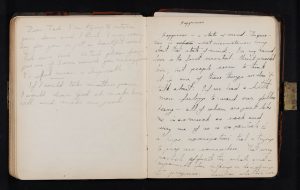By Susan Martin, Senior Processing Archivist
In my last post, I introduced you to Amy Lee (later Colt), whose diary/commonplace-book forms part of the Joseph Lee papers here at the MHS. The volume gives us a peek into the life of an exuberant teenager a century ago, including her crushes. But there’s more to it than that. Amy wrote from about 1918 to 1925, and we’re privy to her innermost thoughts during some major life changes.

First let’s pick up where we left off. The “devilishly handsome” Elliot Stoddard got married in 1920, but Amy’s disappointment was short-lived. She was soon describing other young men, including an unnamed “queer, whimsical, moody, genius” who was “delightfully rude and grumpy with people he dislikes”; Tad with the “beautiful soul,” whose feelings Amy apparently didn’t reciprocate; and Phil, of whom she wrote, “I do not understand my feelings to-ward Phil. I only know that if he is not at a party the party is uninteresting.”
The most serious contender for Amy’s heart during this time was Charlie Balche, “the most adorable, lovable, utterly irresistable & (irrepressable) mischievous little boy that ever stole jam out of a pantry.” Unfortunately, Charlie was as good as engaged to a young woman named “Char,” probably short for Charlotte. This didn’t stop Amy from going to the movies with him.
The sleeve of his coat just rubbed the edge of my arm (and oh how I wished I could hold his hand)[.] We talked a good [d]eal through it but I couldn’t be very intelligent as I was trying to figure how I could stare at him without him seeing me.
Charlie let Amy drive his car home, but she was so distracted that she “nearly killed about 15 people.” Recognizing her feelings for what they were, she pleaded, “I wish he’d hurry up & get engaged to Char before I break my heart.”
Amy was also interested, both romantically and intellectually, in someone named William Fitzgerald.
He stirred my mind more than it has ever been stirred before[.] He challenged my ideals and beliefs[.] He made me want to think through to the end of my beliefs. He’se been kicked out of most colleges, fought in the war at the age of sixteen! and now writes short stories to support himself. He is a clever talker. He is shockingly frank on society[’s] forbidden subjects. I don’t like the look in his eyes but I daresay its just that he takes no pains to conceal what every boy feels. He is so interesting, callous and provocative after these Babes in Arms. He claims that we are still animals and were created by some one with an ironic sense of humour. He says there is no such thing as love. […] Poor darling, I wonder what made him so bitter right through.
Another person that fascinated Amy was her friend Janet Wilson, who gets what I think may be the best description in the entire volume.
People do more than love her, they are possessed by her – nothing is amusing if she is not there to laugh at it. […] For myself – I can’t imagine being without her – she influences my spirits more than anyone I’ve ever known – at present I’m about to cry because she wasn’t smiling tonight […] I love every bit of her – keep her safe. Janet my darling baby you adoreable nonsensical cuckoo. She has dimpled knees, loves doodads, takes a cold bath every morning and walks with her head thrown back. Some cookie. If I were a millionaire I’de b[u]y her a library and perfume cabinet.
“Charlie Balche” may have been Charles Bowditch Balch (1896-1959) of Jamaica Plain, Mass. If so, records indicate he never married. I also found some William Fitzgeralds and Janet Wilsons, but the names were common, and I have no other clues to confirm their identities. But Amy described them so well, I feel I know them a little.
Amy had opinions on a variety of general subjects, too. Some of the pages of her diary include headings like “My Religion,” “What I want to be,” or “Happiness.” Here’s one remark that’s timeless: “I wish in books the heroes ever liked a heroine for anything but her looks – it discourages me – too bad.” Another favorite passage of mine comes under the heading “If I ran society.”
People shouldn’t keep track of their years & shouldn’t pay any attention to old age. The saying [“]I’m to[o] old for this” is all nonsense. People are just as enthusiastic at eighty as they are at ten. It’s all nonsense – stuff and nonsens[e]. I’m going to wait till I get [to] a satisfactory age and stay there.
In the fall of 1920, her mother Margaret fell seriously ill, and Amy’s tone naturally became more somber. She composed poems dedicated to her mother and prayers for her recovery. Unfortunately, Margaret Lee died on 27 November 1920 at the age of 54. Amy wrote, “Mother has died, but I feel as if she were still here.” And after a few pages of memories of Margaret, she finished with: “Love is the law of the world – nothing else matters.”
The main thing I take away from Amy’s diary is her relatability. She wasn’t perfect. Some entries reflect the outdated opinions of her time or reference unspecified lies and selfish actions she committed and regretted. But while some historical people feel remote, Amy seems to me “as if she were still here.”
In my next post, I’ll finish up the story of Amy Lee Colt. Stay tuned!

